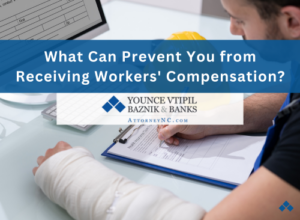 If you are suffering from a workplace injury, it can be a very challenging experience for you. Not only do you have pain and suffering caused by the injury, but you may be faced with medical bills and other expenses that you can’t pay.
If you are suffering from a workplace injury, it can be a very challenging experience for you. Not only do you have pain and suffering caused by the injury, but you may be faced with medical bills and other expenses that you can’t pay.
Many workplace injuries make employees unable to perform work duties, either temporarily or permanently. It can take a few months or even longer to heal, and you may wonder how you are going to provide for yourself or your family while you are out of work.
Workers’ compensation can assist you during this difficult time. Workers’ compensation claims handle any expenses related to injuries that happened on the job. These expenses can include hospital visits, tests, scans, surgeries, and physical therapy costs. Workers’ compensation also covers any permanent disabilities that result from a workplace injury.
What Not to Do During a Workers’ Compensation Case
If you are injured on the job, you may be confused and unable to make clear decisions about what to do. You need to take certain steps to ensure that you do not jeopardize receiving workers’ compensation for your injuries and lead to the insurance company or employer stopping your workers’ comp checks. These are the mistakes you need to avoid when working with your doctor, your employer, and the employer’s insurance company.
- Not Documenting Your Workplace Accident
If you are able, you need to document what happened and how you were injured right away. While your co-workers might witness your injury and offer to help, they will only be able to document their version of the incident. Your account of how you were injured will be crucial in determining your workers’ compensation case. It’s important to take notes about statements that your co-workers or medical personnel made on the scene. Even details that may seem insignificant could be critical to your workers’ compensation claim. The longer you wait to write down these details, the more likely you will forget them. Any injuries, pain, or symptoms that you experience should also be documented. Keep track of your doctor visits and medications that you are taking and document them in a spreadsheet. It is important to keep copies of bills, medical records, lab reports, travel expenses (to and from appointments), and any other costs associated with the injury. Request a copy of the accident report to keep for your records, and make sure it is accurately filled out. - Not Providing Your Doctor with all the Details of Your Injury
Not only is it essential to inform your physician about all the details of your workplace injury, but also about any pre-existing conditions you have suffered. Pre-existing conditions include prior injuries you had before the accident or injuries that occurred to the same part of the body as the current injury. Be honest with your doctor about your symptoms and any changes to these symptoms that you experience. If your injury is getting better, you need to let your doctor know that as well. - Exaggerating Your Injuries and Symptoms
To strengthen a worker’s compensation claim, some employees may embellish their symptoms or fabricate other injuries. Your doctor will most likely perform several tests during your examination to determine if you are exaggerating your injuries. If he or she believes you are falsifying symptoms, it will damage your workers’ compensation case. Also, embellishing your claim is considered insurance fraud and is illegal. - Seeking Medical Care
Under workers’ compensation law, the insurance company or your employer directs your medical care. Except in the case of emergency situations, they must authorize any care you receive. You are entitled to a second opinion about treatment options and/or a second opinion about a disability rating. - Not Following Your Doctor’s Advice
It is imperative that you follow your doctor’s advice and treatment plan. Failing to follow your doctor’s advice may lead the insurance company to make a determination as to whether your injuries are legitimate or not. You may feel better and then assume that it is okay to discontinue care. Sometimes, symptoms may diminish during treatment but can return or get worse later if you stop following your treatment plan.

















